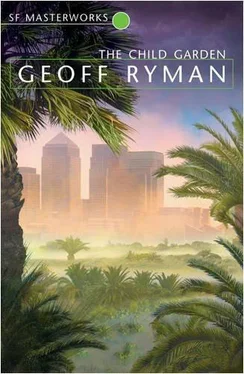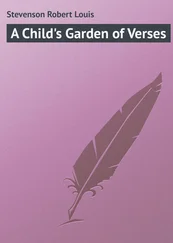Beatrice and Dante alluded to their old love. Dante sang:
Si come cera da guggello…
Even as wax under the seal that
does not change the imprinted figure,
my brain is now stamped by you.
Rolfa kept singing without words. Her voice would now not leave the rest of the opera, hoarse and enraged, echoing out of Virgil Street. On the Day of the Dogs, Rolfa had been singing the end of the last Canto, alone in the dark.
Elsewhere in the Comedy, Dante was saying that he could not remember that he ever estranged himself from Beatrice or the conscience of having wronged her.
The viruses will know what that means, thought Milena.
He has drunk the waters of Lethe and has forgotten all the wrong he did in life.
He doesn’t remember losing Beatrice. That means losing Beatrice was a sin.
Like my not speaking to Rolfa. Like my not loving her. Milena’s hands were stroking something soft and spilled. Piglet was still in her lap.
And outside the helicopter, on a level with it, were the black balloons that went up from Waterloo Bridge. They were swollen and singing gently to themselves the music they heard. The light reflected on their hides. Faces from memory flickered on their surface.
And the music walked through an Eden that was made of old brick. It spoke of life in the stone, in the ground, in the air. Air moved like the trees and the grass; brick was as solid as stone. It was fulgent and fragrant; even in old London, wafting with history. Touches of minor keys and discords made it disturbing, pained. Odd sour notes glinted like light on falling leaves. The music became an eerie dance, as if, unseen, the Garden was dancing to itself, by itself. The dance was lost to us.
Beatrice and Dante walked across Westminster Bridge Road and into the Cut: the Cut that no longer existed, the Cut in the Summer of Song. There were all the old familiar faces; the boy with the Hogarth face; the slim clothseller and his pretty wife; the seller of mirror lenses. They were a chorus. For the first time, the narrative was sung. They sung about the sun at the meridian, noon on the heights of Purgatory.
In this Comedy, the Pit, the sink of Hell and the heights of the mountain were the same place. Eden and all the other circles up and down overlapped each other in layers, in a world of layers.
Is that plain enough? wondered Milena. Will they understand this Low and earthbound Comedy of mine?
Could I have done Heaven like this, Paradiso? Could I have found heaven on Earth as well? Who will finish the Comedy? Should anyone finish it, or should it exist only in the pages of Rolfa’s book?
Then she thought of little Berry, who sang. He had sung the music of the Comedy before he could speak, as he lay helpless in Milena’s rooms. As if a sword had been jammed into her throat, Milena had the metal taste of certainty. It would be Berry, little Berry. He would finish the Comedy. He would keep it alive. She seemed to see herself passing it to him. What she passed to him was its smallness not its grandness: The Comedy was the size of flower.
She felt herself flush with light. Her whole skin blazed with it. It illuminated the inside of the helicopter. It shone through the open door. The people below saw her in the sky overhead: light in the shape of a woman. There was a roar from below.
A weight was taken off her. The helicopter began to descend.
Beside the loading bay there were suddenly thick, purple leaves, flapping like great wings and bowing away from her. In the forest of the Consensus, Milena looked up. She saw Dante and Beatrice come out of Leake Street and walk towards the river. The chorus sang of the seven ladies stopping in cool shade. Dante and Beatrice walked into the shadow of the Shell.
The leaves of the Consensus applauded. Milena heard shouts from below, and the helicopter descended into a forest of hands beneath the forest.
More Garda dancing, flicking up bolts, sliding her from the helicopter. All around them, Singers were singing, Bees were chanting. ‘Give us the disease, Milena. Milena, the disease!’ Someone was licking her hand, to become ill. The stretcher was turned around and Milena saw people in the windows of Marsham Street. There were people on the steps and under the fleshy trees. The people roared. Flowers were cast over her. They fell like rain, human flowers, real flowers.
What a fuss, she thought, what a fuss to make over a second-rate director. But she knew it was the conjunction of the cancer and the Comedy, both together.
Overhead Dante walked the banks of the River Thames. By Hungerford Footbridge he climbed down steps, wading into the water. The River Thames flowed like history. The Thames was now the River Eunoe, that restores the memory of the good a soul has done in life, its labours of love.
Below, in Marsham Street, the Singers began to sing one of Rolfa’s songs. The Bees joined in, unable to resist. They all began to sing in Dog Latin, as the lips of the Consensus parted, and its mouth opened amid its own forest.
Modicum, et non videbitis me;
Et iterum
sorelle mi dilette
modicum et vos videbitis me.
A little while and ye shall not see me,
And again a little while and you shall see me.
Oh no, you won’t, thought Milena. Then over all the other voices, she heard one other voice begin to sing.
Just a dog of a song
Just a dog of a song
Ambling gently along
With no bad feelings no ill will
The voice was weak and distant. Who is singing? thought Milena. She was too weak to turn her head to see. Then she realised: she was the one who was singing. She was singing something from the old London that was gone, nothing to do with the chants and the sound of the grand opera overhead. She was singing for the Spread-Eagle and the street markets and the men unloading beer barrels and the starlings who lived in the trees and the crumbling buildings and the fringed and heavy feet of the carthorses and for the children who peddled coffee: for the children, for Berry, and for the very old people they would now turn into.
And it doesn’t know how to end
And it’s so hard when you a lose a friend.
Just a dog of a song
But
Milena felt the bier wobble as she was carried onto the tongue of the Consensus. She looked up through the fleshy trees and the tangle of leaves to the sky, where the light played. All the world seemed to be submerged in water, clear and full of bubbles that looked like pearls. The water of Eunoe, memory. Rolfa’s music gathered for a final blow. This is the last I’ll see of the Comedy, thought Milena. Yet it was not the Comedy, or her great position or the Zoo or this circus that Milena would miss.
We all sing along
But
We all sing along
The living tongue of the Consensus cradled them, and bore them all down into itself, and the sound and the light were lost.
But the silence remained.
CHAPTER TWENTY
What Happens Next?
(An Orchestra of Ghosts)
Inside the white brick corridors all the children had gone. The Reading Rooms were empty; no children sang; there was no sound of guitars or bells. There was only the muffled sound of the Comedy above and the harsh glow of the bare electric light.
Milena was lowered to the floor. She could smell dust. Mike was lowered next to her, on his sling chair. There were flowers in his lap, flowers that had been thrown over him. As he leaned forward over Milena’s bier the flowers spilled onto the floor.
‘You all right?’ he asked gently.
‘I’m fine,’ she answered.
Читать дальше












